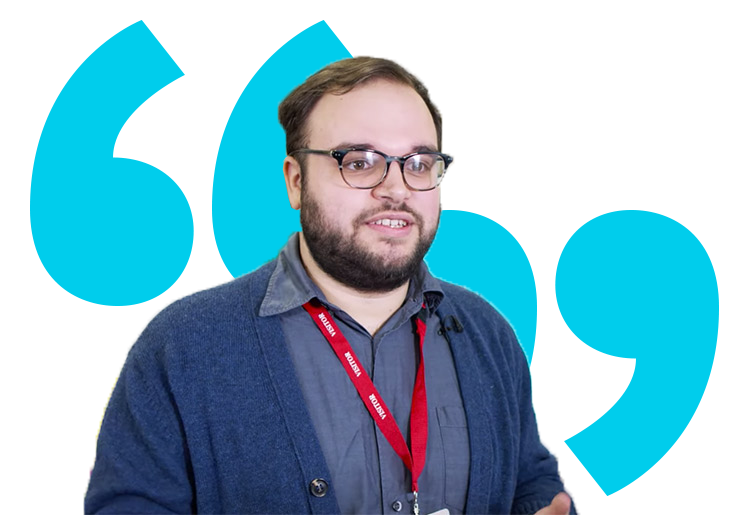"Don’t be put off, or don’t be scared about not knowing enough of the technical side of things, it’s something that you will learn while you are doing the course and it’s something you will learn while you are in the job."Thomas Flower – PDGE student

Hear more from Thomas, and watch the video
Minimum requirements to train as a teacher in Scotland
You’ll need at least the following qualifications to train in Scotland:
- English at SCQF Level 6 and Maths Level 5.
- Two other National Qualifications at SCQF Level 6, and one other subject at SCQF Level 5 for an undergraduate degree.
- An undergraduate degree awarded by a UK higher education provider for PGDE programmes.
- Membership of the Protecting Vulnerable Groups scheme.
- Classroom experience.
Find out more on the Scottish Credit and Qualification Framework (SCQF).
Studying for a PGDE
The Professional Graduate Diploma in Education (PGDE) is the graduate entry route for those who want to become a primary or secondary teacher in Scotland.
The Scottish PGDE primary trains you to work with children typically aged between 4-12, whilst a PGDE secondary qualifies you to teach 11-18-year-olds.
In secondary PGDE training, you qualify in a single subject or a dual subject combination. The PGDE guarantees a teaching post for the first year, after completion.
The PGDE is an internationally recognised qualification, and post-probationers will be able to apply for qualified teacher status (QTS) or equivalent in their home country.
Most PGDE courses last a year if you study full-time. Some providers offer a part-time route, which can take up to two years.
After passing the PGDE, you’ll become a probationer – and you’ll need to complete a probationary year. This, like the PGDE itself, includes mentoring sessions, extra preparation time, and extra lesson observations. On passing your probationary year, you’ll become a fully qualified teacher.
How does the PGDE work?
In a full-time 36 week PGDE, you’ll spend around half the time (18 weeks) at university, learning teaching theory and techniques. For the remainder of the time, you’ll work on teaching placements, conducting classes with the help of mentors and other professional support.
Why choose to do a PGDE?
The PGDE course could be a perfect route into teaching if you’ve completed a subject-based undergraduate degree – such as French, Maths, Physics or English.
It provides you with the theory and training opportunities to apply your detailed subject knowledge to teaching.
As well as being a route to qualified status (which you need in order to teach in any Scottish school), the PGDE also carries serious academic value. For instance, it can lead to a Masters in the future, if you choose.
Additionally, many students find it very reassuring that the PGDE comes with a guarantee that they’ll have a teaching post for their probationary period.
A PGDE is respected around the world, and can open doors wherever you choose to live, work and teach.
The University of the Highlands and Islands (UHI) also offers part-time PGDE primary and secondary English medium programmes, that can be studied from anywhere in Scotland, with school placements in local schools, which are aimed at graduates wishing to follow a part-time route to become a teacher.
Entry requirements for the PGDE
Primary teaching
The minimum entry requirements for a PGDE for primary education are:
- an undergraduate degree validated by a UK higher education institution, or an undergraduate degree of equivalent standard from an institution outside the UK
- a national qualification in English at SCQF level 6 (eg higher grade) or an accepted equivalent
- a national qualification in mathematics at SCQF level 5 (eg national 5) or an accepted equivalent.
Secondary teaching
The minimum entry requirements for a PGDE for secondary education are:
- an undergraduate degree validated by a UK university, or an undergraduate degree of equivalent standard from an institution outside the UK.
- a national qualification in English at SCQF level 6 (eg Higher grade) or an accepted equivalent
- a national qualification in mathematics at SCQF level 5 (eg National 5) or an accepted equivalent.
However, individual universities set their own entry requirements and are likely to require four Highers (often at AABB), so please double-check actual course requirements with the university in question before applying.
Aberdeen University also offer flexible online courses to help you gain the qualifications you need to meet the PGDE entry requirements.
More teacher training options
There are different teacher education programmes, designed to offer flexibility, and encourage diversity in the profession.
These include:
- Postgraduate MSc Transformative Learning and Teaching programme – University of Edinburgh
- BA (Hons) Food, Nutrition and Textiles Education – for teaching Home Economics – University of the Highlands and Islands
- BSC Education and Curricular Studies with Teaching Qualification – University of Strathclyde. This course enables students with an HND in home economics or technological education to start in year 3 of a 4 year undergraduate programme and achieve a university honours degree with a Teaching Qualification on completion
- For those who already have a teaching qualification, University of Edinburgh offer a Returning to Teaching course
- Moral and Philosophical Studies with Religious Education BA (Hons) at University of the Highlands and Islands. This course is aimed at those considering a career as a Religious Education (RE) or Religious, Moral and Philosophical Studies (RMPS) teacher in a Secondary School setting, or to those interested in exploring theological, moral and philosophical issues and debates, who would like to gain an understanding of how to lead learning.
- Technological Education BSc (Hons) at University of the Highlands and Islands. This course is aimed at those wanting to teach technical subjects including Craft Design Technologies (CDT) and Home Economics in Secondary School settings.
Most of the programmes are linked to local authorities and involve teaching in schools within these local authorities during the course.
How to join a teaching course
Every potential teacher must apply for their chosen course via UCAS – an organisation that manages all college and university applications. Although some courses in Scotland remain open until all places are filled, be sure to check throughout the year to see what’s available.
If you submit your application by mid-January, you’ll have a decision by the start of May. Although many courses in Scotland remain open until all places are filled, so be sure to check throughout the year to see what’s available.
You can find out more about what happens after you have submitted your application, direct from UCAS.
Qualified as a teacher in another country?
Scotland is a wonderful place to develop your teaching career, and enthusiastic, dedicated teachers are always going to be warmly welcomed. With our comprehensive, free, state education system for all children from 5 to 18, there are some great opportunities for great teachers.
The first thing to do is apply for registration with the General Teaching Council for Scotland as they welcome applications from teachers who have qualified outside Scotland.
Our national Curriculum for Excellence is specifically designed to encourage teachers to deliver their own creative, engaging lessons. So you can bring all your skills, and life experiences, to the table!
There’s also lots of support available for EU citizens to Stay in Scotland.
If you are an EU citizen, please remember to check on your settled status if you are undertaking a PGDE and the teacher induction scheme.
EU citizens must apply to the UK Government’s EU Settlement Scheme by 30 June 2021 in order to continue living, working and studying in the UK after that date. If you are an EU citizen, or if you have colleagues or family members who are from an EU country, the Scottish Government’s Stay in Scotland resources can help.
Returning to teaching
If your journey has taken you away from the classroom for a while, now could be the ideal time to return to teaching. For more information visit our ‘Returning to teaching’ page. ‘Returning to teaching’ page.
Teaching in rural areas
Around 38% of all schools in Scotland are officially considered rural – meaning they are in a catchment area of fewer than 3,000 people. Schools are at the heart of rural communities – and they provide a tremendous opportunity for new teachers to gain valuable experience.
It’s not just the teaching opportunities that are attractive. Many rural schools are in some of Scotland’s most beautiful locations. Find out more here
Diversity in teaching
Young people gain so much by learning from teachers who come from a variety of backgrounds and cultures. Diversity in the classroom also helps them prepare for a rich and varied working environment. Within the teaching community in Scotland, there are lots of networks to support ME teaching staff, such as the Scottish Association for Minority Ethnic Educators (SAMEE).
"In my work I want to continue to give quality education and, as a black teacher of African origin, I want to see diversity in the teaching profession. I believe I have to help young people to be the best they can be."Mary Osei-Oppong – Business Education and ICT Teacher

"What are we doing this for? We’re doing it for inspiring and supporting young people of all backgrounds, all learning needs, and wherever they come from. It doesn’t matter what colour of skin they are, what ethnicity they are, what religion they are, girl, boy, transgender. It doesn’t matter. We’re all in this together. "Shiv Das – Geography teacher at Boroughmuir High School

Learn more about Shiv. Watch the video
Career change into teaching
If you’re a little disillusioned with your current job and longing for a career with more meaning and purpose, a switch into teaching could be perfect for you.
There are many teachers who started their careers doing something completely different. And all skills, talents and backgrounds are useful as a teacher. Life experiences are particularly valuable when working with young people – so age needn’t be a barrier, either. If you have the desire and determination to succeed as a teacher, there’s nothing to stop you.

